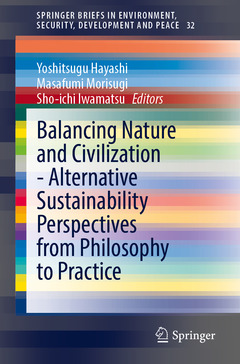Description
Balancing Nature and Civilization - Alternative Sustainability Perspectives from Philosophy to Practice, 1st ed. 2020
SpringerBriefs in Environment, Security, Development and Peace Series, Vol. 32
Coordinators: Hayashi Yoshitsugu, Morisugi Masafumi, Iwamatsu Sho-ichi
Language: English
Subjects for Balancing Nature and Civilization - Alternative...:
Publication date: 02-2020
119 p. · 15.5x23.5 cm · Paperback
119 p. · 15.5x23.5 cm · Paperback
Description
/li>Contents
/li>Biography
/li>Comment
/li>
This book is an outcome of an international symposium: Sustainability ?Can We Design the Future of Human Life and the Environment? which was held as a satellite event of the ?Love the Earth?-Expo 2005 (Aichi, Japan). Each chapter is based on the lecture given by the following eminent researchers: Yoshinori Ishii, Hans-Peter Dürr, Yoshinori Yasuda, Minoru Kawada, Yasunobu Iwasaka, Werner Rothengatter, Hisae Nakanishi, Yang Dongyuan, Lee Schipper, Itsuo Kodama, and Yoshitsugu Hayashi.
In the Part I titled ?A Sustainable Relationship between Nature and Humans?, we discuss what will become of fossil fuels and petroleum, and what kind of indicators should be used to monitor the energy expended by human society. We then discuss environmental impacts caused by different civilizations and values on Nature and ethics, based on the perspective of environmental archaeology and on the discussions by Kunio Yanagita, the father of Japanese folklore study.
The Part II is titled and shows ?International Conflict Concerning Environmental Damage and Its Causes?. The Asian dust (Kosa) is a typical example of transboundary conflicts between nations. Another example can be found in the EU?s attempt to put in place a common motorway toll system across EU countries having different geographical and economic conditions. Finally, Part III covers the opinions and further debates on sustainable future earth based on the lectures in Parts I and II.
We hope that great insights in this book will come across to readers, and be of help in steering the world towards a sustainable society in harmony with biosystems on earth.
1.Introduction: Can We Design the Future of Human Life and the Environment?.- Part I A Sustainable Relationship between Nature and Humans.- 2.The Fate of Twentieth-Century Civilization – A Discussion of “Post-oil Strategies”.- 3.Sustainable Use of Energy.- 4.Sustainability from the Perspective of Environmental Archaeology.- 5.Re-evaluating the Traditional Japanese Perspective on Nature and Ethics.- Part II: International Conflict Concerning Environmental Damage and Its Causes.- 6. Kosa (Asian Dust Particles) and Air Pollution in Asia.- 7. Environmental Charges Levied on Heavy Goods Vehicles in the EU.- Part III: Ecological Balance and Conflicts in the 21st Century.- 8.Panel Discussion.
Yoshitsugu Hayashi (Japan), born in 1951, Professor Emeritus, Nagoya University; and Director, International Research Center for Sustainable Development and Global Smart Cities, Chubu University; Distinguished Visiting Professor, Tsinghua University, China. He is a Full Member of the Club of Rome and President of the Japan Chapter, and also has been President of WCTRS (World Conference on Transport Research Society) till May 2019. His major fields of research are analysis and modelling of transport – land use interactions and the countermeasure policy to overcome negative impacts of urbanization and motorization. The results are published in such books as Land Use, Transport and The Environment (Kluwer,1996), Urban Transport and the Environment – An International Perspective (Elsevier, 2004), Intercity Transport and Climate Change – Strategies for Reducing the Carbon Footprint (Springer, 2014), the Japanese Edition of Factor 5 (Akashi-shoten, 2014) originally authored by Ernst Ulrich von Weizsaecker et al., section author of Come on: Capitalism, Short-termism, Population and the Destruction of the Planet (Club of Rome Report, Springer, 2018) edited by Weizsaecker and Wijkman. Applications to practice include his proposition of rail transit oriented urban reform to overcome Bangkok’s hyper congestion as the leader of JICA project in mid-90’s, which became the trigger to reverse the budget of road vs. rail from 1:99 in 90’s to 82:14 in Transport 2020 Plan. He is also now JICA/JST research project leader of “Smart Transport Strategy for THAILAND 4.0”.
Masafumi Morisugi (Japan) Born in 1970. Professor at Meijo University, Japan. Doctor of Engineering and Master of Economics (Nagoya University), a visiting scholar at Wuppertal Institute for Climate, Environment and Energy, Germany in year of 2017. Various activities around environmental economics and policies. His current research interests include evaluation several economic damages due to
Written and discussed by world eminent researchers
Easy and clear descriptions for broad range of readers
Rich perspectives on the environment such as civilization and ethics
© 2024 LAVOISIER S.A.S.




